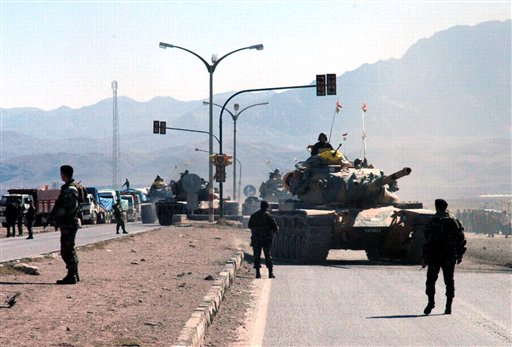Turkey launches ground incursion into Iraq, escalating conflict with Kurd rebels

Turkish army tanks return their bases near the Turkish-Iraqi border town of Silopi in the Sirnak province, southeastern Turkey, Friday, Feb. 22, 2008. Turkish troops launched a ground incursion across the border into Iraq in pursuit of separatist Kurdish The Associated Press
February 22, 2008
ISTANBUL, Turkey – Turkish troops have launched a ground incursion across the border into Iraq in pursuit of separatist Kurdish rebels, the military said Friday.
It is the first confirmed ground operation by the Turkish military into Iraq since the U.S.-led invasion that toppled Saddam Hussein. It also raised concerns that it could trigger a wider conflict with the U.S.-backed Iraqi Kurds, despite Turkish assurances that its only target was the Kurdistan Workers Party, or PKK.
The ground operation started after Turkish warplanes and artillery bombed suspected rebel targets on Thursday, the military said on its Web site. The ground incursion was backed by the Air Force, the statement said.
Turkey has conducted air raids against the PKK guerrillas in northern Iraq since December, with the help of U.S. intelligence, and it has periodically carried out so-called “hot pursuits” in which small units sometimes spend only a few hours inside Iraq.
The announcement of a cross-border, ground incursion of a type that Turkey carried out before the U.S.-led invasion of Iraq in 2003 was a major development in the conflict, which started in 1984 and has claimed as many as 40,000 lives.
Get The Daily Illini in your inbox!
The Kurdish militants are fighting for autonomy in Turkey’s predominantly Kurdish southeast, and have carried out attacks on Turkish targets from bases in northern Iraq. The U.S. and the European Union consider the PKK a terrorist organization.
“The Turkish Armed Forces, which values Iraq’s territorial integrity and its stability, will return as soon as planned goals are achieved,” the military said. “The executed operation will prevent the region from being a permanent and safe base for the terrorists and will contribute to Iraq’s stability and internal peace.”
Private NTV television said 10,000 troops were taking part in the offensive and had penetrated six miles into Iraq.
The state-run Anatolia agency reported that warplanes were seen taking off from the air base in Diyarbakir in southeast Turkey. It said planes and helicopters were conducting reconnaissance flights over the border region, and that military units were deployed at the border to prevent rebel infiltration.
Dogan News Agency reported that the Habur border crossing, a major conduit for trade between Iraq and Turkey, was closed to vehicle traffic.
CNN-Turk television, however, quoted Deputy Prime Minister Hayati Yazici as saying the border gate was not closed but that priority was being given to Turkish military vehicles. Trucks routinely ferry supplies bound for U.S. military bases in Iraq through the Habur crossing.
Rear Adm. Gregory Smith, a U.S. spokesman in Iraq, said the military had received assurances from its NATO ally Turkey that it would do everything possible to avoid “collateral damage” to innocent civilians or infrastructure.
“Multi-National Forces-Iraq is aware Turkish ground forces have entered into northern Iraq, for what we understand is an operation of limited duration to specifically target PKK terrorists in that region,” Smith said in a statement.
“The United States continues to support Turkey’s right to defend itself from the terrorist activities of the PKK and has encouraged Turkey to use all available means, to include diplomacy and close coordination with the Government of Iraq to ultimately resolve this issue,” he added.
Turkish President Abdullah Gul spoke with his Iraqi counterpart Jalal Talabani late Thursday and gave him information about the goals of the operation, Gul’s office said. Gul also invited Talabani to visit Turkey.
The military said its target was PKK rebels and that it does not want to harm civilians “and other local groups that do not act in enmity against the Turkish Armed Forces.”
Nihat Ali Ozcan, a terrorism expert with the research center TEPAV, said the operation was launched at this time to hit the group before any infiltration by rebels into Turkey in the spring, the traditional start of the fighting season.
“I think it is aimed to keep the PKK under pressure before the group starts entering Turkey,” he said on CNN-Turk television.
Iraqi border forces officer Col. Hussein Tamer said Turkish shelling on Thursday hit several Kurdish villages in the Sedafan area, some 20 miles from the border.
Jabbar Yawar, a spokesman for Iraqi Kurdish security forces, said sporadic bombing was taking place in the border areas, but no casualties were reported.
Fouad Hussein, a spokesman for the semiautonomous Kurdish government in Iraq, said the Kurdish Peshmerga forces had been put on alert.
He said Iraqi Kurdish forces also had tightened security around bases housing Turkish military monitors operating in northern Iraq with permission from local authorities under a 1996 agreement.
“The government of Kurdistan ordered the Peshmerga forces to be on alert in fear of any Turkish incursion on Iraqi territory,” he said, claiming that Turkish military monitors had tried to leave their bases in violation of the accord.
“Those troops tried to move out, but the Peshmerga forces forced them to return to their camps within half an hour,” he said.
In Ankara on Thursday, Turkey’s civilian and military leaders issued a statement after a meeting on national security, saying cross-border attacks by the military would continue as long they were “deemed necessary.”






